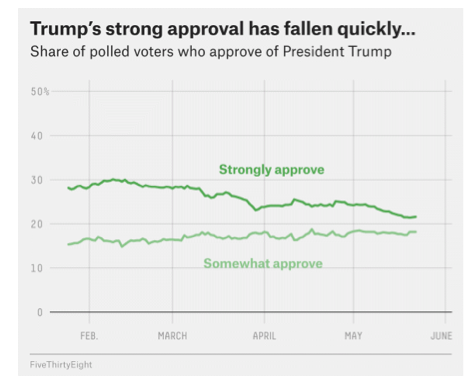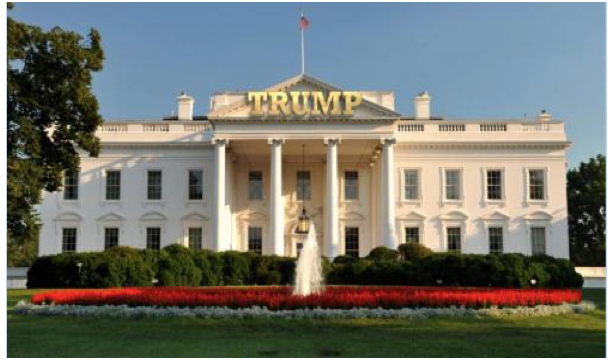CommentsHULLABALOO--Nate Silver makes a helpful observation about Donald Trump's allegedly immovable base:
A widely held tenet of the current conventional wisdom is that while President Trump might not be popular overall, he has a high floor on his support. Trump’s sizable and enthusiastic base — perhaps 35 to 40 percent of the country — won’t abandon him any time soon, the theory goes, and they don’t necessarily care about some of the controversies that the “mainstream media” treats as game-changing developments.
It’s an entirely reasonable theory. We live in a highly partisan epoch, and voters are usually loyal to politicians from their party. Trump endured a lot of turbulence in the general election but stuck it out to win the Electoral College. The media doesn’t always guess right about which stories will resonate with voters.
But the theory isn’t supported by the evidence. To the contrary, Trump’s base seems to be eroding. There’s been a considerable decline in the number of Americans who strongly approve of Trump, from a peak of around 30 percent in February to just 21 or 22 percent of the electorate now. (The decline in Trump’s strong approval ratings is larger than the overall decline in his approval ratings, in fact.) Far from having unconditional love from his base, Trump has already lost almost a third of his strong support. And voters who strongly disapprove of Trump outnumber those who strongly approve of him by about a 2-to-1 ratio, which could presage an “enthusiasm gap” that works against Trump at the midterms. The data suggests, in particular, that the GOP’s initial attempt (and failure) in March to pass its unpopular health care bill may have cost Trump with his core supporters.
This will be read as people coming to understand that he was breaking his promise to help the white working class and so they abandoned him. But the truth is that these folks didn't abandon him. They just moved from "strongly support" to somewhat support.
If I had to guess, I'd say that at least a few of his "strong" supporters realized that the health care debacle showed that his much hyped "skill" as a negotiator was bullshit. He revealed himself to be stupid, naive, clumsy and inept in that moment and perhaps all the stories they'd heard about him being a con-artist always one step ahead of the law and his multiple bankruptcies and his idiotic rhetoric wasn't all partisan nonsense but rather a true picture of a man who had no qualifications for this big job.
The "strongly disapprove" numbers have been growing too but for different reasons:
The number of Americans who strongly disapprove of Trump has sharply risen since early in his term, meanwhile, from the mid-30s in early February to 44.1 percent as of Tuesday. In most surveys, Trump’s strongly disapprove rating exceeds his overall approval rating, in fact.
The bulk of the increase in Trump’s strong disapproval ratings came early in his term, over the course of late January and early February. It’s possible that this was partly a reaction to Trump’s initial travel ban on immigrants from seven predominantly Muslim countries, which was the biggest news of Trump’s first few weeks in office. But presidential disapproval often rises in the first month or so of a president’s tenure as voters who initially give a new president the benefit of the doubt find things to dislike in his performance.

Meanwhile, the share of Americans who somewhat disapprove of Trump has been small and fairly steady throughout his term, usually averaging around 10 or 11 percent. It was 11.6 percent as of Tuesday.
Silver puts this into some useful perspective:
During last year’s presidential primaries, Trump received about 14 million votes out of a total of 62 million cast between the two parties, which works out to 23 percent of the total. So perhaps it’s not a coincidence that 20 to 25 percent of the country still strongly supports Trump; they were with him from the start.
But 20 to 25 percent isn’t all that large a base — obviously not enough to win general elections on its own. Instead, Trump won the White House because most Republicans who initially supported another GOP candidate in the primary wound up backing him in the November election. Trump has always had his share of reluctant supporters, and their ranks have been growing as the number of strong supporters has decreased. If those reluctant Trump supporters shift to being reluctant opponents instead, he’ll be in a lot of trouble,3 with consequences ranging from a midterm wave against Republicans to an increased likelihood of impeachment.
So while there’s risk to Democrats in underestimating Trump’s resiliency, there’s an equal or perhaps greater risk to Republicans in thinking Trump’s immune from political gravity.
Let's hope so.
(Heather Parton blogs under the pseudonym Digby at the blog site she created: Hullabaloo and also writes for Salon and ourfuture.org)
-cw









